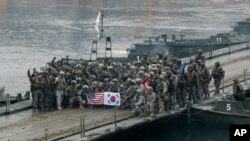The U.S. military said Tuesday it has intensified air defense drills in South Korea and conducted an aircraft carrier exercise in the Yellow Sea as part of a “demonstration of resolve” following two partial North Korean tests of a new long-range missile.
The military displays came as U.S. officials warned North Korea could soon conduct a full test of a new intercontinental ballistic missile, possibly under the guise of a satellite launch. South Korean news outlets report U.S. and South Korean authorities have detected signs that a launch could occur as soon as this week.
The situation risks a return to tensions not seen since 2017, when North Korean leader Kim Jong Un and former U.S. President Donald Trump exchanged threats of nuclear war before engaging in a series of unprecedented talks. For now, the rhetoric on both sides is much more restrained.
In a statement Tuesday, U.S. Forces Korea (USFK) said it “increased the intensity” of a regular “certification exercise” involving the Patriot missile defense system. The exercise, which involved a simulated combat scenario, “underscores the seriousness USFK takes against the DPRK’s recent missile launch behavior,” the statement said, using an abbreviation for North Korea’s official name.
Hours later, the U.S. Indo-Pacific Command (INDOPACOM) announced it had conducted an aircraft carrier-based exercise in the Yellow Sea, which lies off Korea’s west coast. The exercise involved fourth and fifth generation aircraft, the most advanced currently in operation. It was a “demonstration of our resolve and commitment to our regional allies,” INDOPACOM said.
Both statements condemned North Korea’s “significant increase” in missile testing. So far this year, North Korea has fired 13 missiles during nine rounds of launches.
Last week, the U.S. military said it had intensified its intelligence collection activities around the Korean Peninsula and heightened its ballistic missile defense readiness in response to the North Korean launches.
Change in approach
Since Trump and Kim’s diplomacy began in 2018, the U.S. military has downsized or spread out its military exercises and has mostly refrained from public demonstrations of military power that risk raising tensions on the Korean Peninsula. But that era may now be ending, as North Korea ramps up weapons tests that the U.S. sees as a major provocation.
“It demonstrates the Biden administration's emphasis on strengthening deterrence in the face of North Korean provocation. It also signals to Pyongyang that contrary to its intent, raising tension by toying with ICBMs won't lead to a seat at the negotiating table down the road. In this sense it represents a clear break from the Trump era,” said Go Myong-hyon, a research fellow at Seoul’s Asan Institute for Policy Studies.
Under President Joe Biden, U.S. officials have repeatedly said they are willing to meet North Korea “anywhere, anytime” without preconditions. North Korea has rejected or ignored the offer. Instead, the North has been systematically working through a wish list of strategic weapons laid out by Kim last year.
North Korea has many possible reasons for testing weapons, including pressuring the United States to make concessions in nuclear talks, demonstrating deterrence, ensuring the performance of new weapons, and bolstering domestic political support.
South Korean President-elect Yoon Suk-yeol, who will take office in May, has promised a more forceful North Korea policy than his predecessor, President Moon Jae-in. Yoon has called Moon’s outreach to the North “a complete failure.”
North Korea escalates tests
Yoon will inherit a tense situation. In January, North Korea fired more rockets than in any previous month on record. According to U.S. and South Korean officials, North Korea’s last two launches were partial tests of a new ICBM.
The new ICBM was first seen during a military parade in October 2020. Experts dubbed it the "monster missile,” noting that it appeared large enough to fit multiple warheads, which could pose a challenge for U.S. missile defenses.
North Korea had not given many details about the tests other than to say they were in preparation for the launch of a military spy satellite.
North Korea has not conducted a long-range missile launch since 2017. Kim announced a self-imposed moratorium on ICBM and nuclear tests in 2018.
U.S. intelligence officials believe North Korea could conduct a nuclear test later this year, according to an assessment released last week.
In 2018, North Korea announced the closure and dismantlement of its nuclear test site. Last week, South Korea’s military said it had detected activity apparently meant to restore some of the tunnels there.




